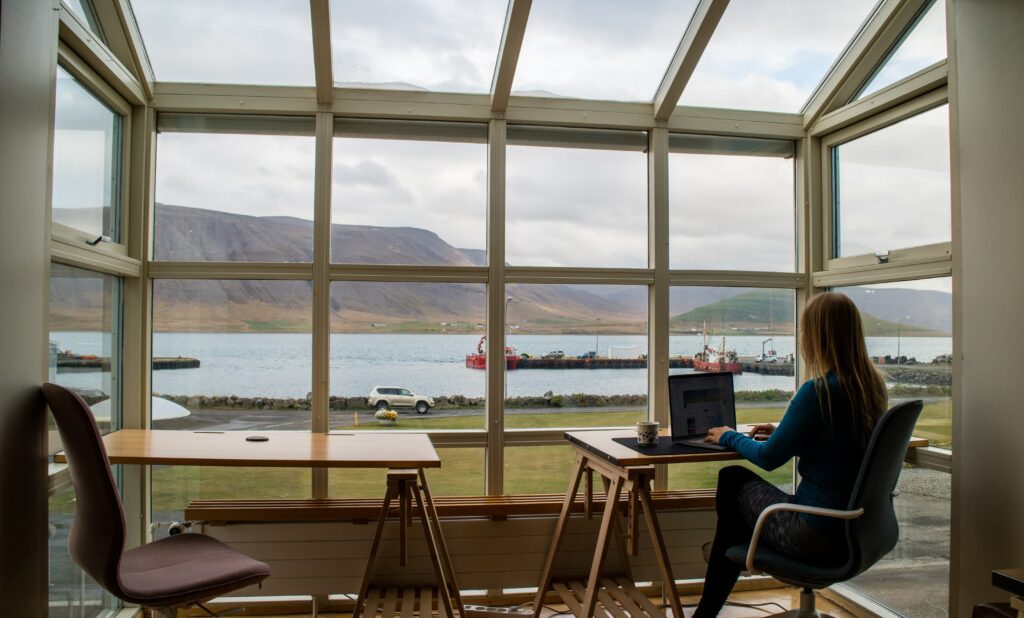Here at Imaginaire, we are immensely fortunate to have the flexibility to work abroad on occasion. This can be for reasons such as having friends and family abroad, having lived abroad before and having a base in a second country, or just wanting a change of pace – we find that having this flexibility allows us to refresh and not feel tied down to one location all the time. We do still love coming into the office and spending time with each other though!
No doubt a lot of us consider working abroad for a while during our careers, but for a lot of us it can feel daunting or even impossible. This guide hopes to give you some tips and tricks so that you can feel comfortable working when working away from the office, and some things that are unique to working internationally in comparison to your usual remote work-from-home setup.

Pre-departure preparation
Working abroad requires careful pre-departure planning. Taking the time to plan and organise essential aspects beforehand sets the foundation for a successful and smooth transition, both for yourself and your colleagues. Here are some crucial steps to consider:
Research Visa Requirements and Legal Considerations
Make sure to check the visa requirements and legal obligations of the destination country. These differ greatly from country to country so it is difficult to make generalisations, make sure to google ‘remote working in X country’ to see if you have any specific requirements. This can also differ depending on your job role, so make sure you check with your manager to ensure everything is above board.
Notify your company or clients
It goes without saying that you should sit down with your manager to discuss how things will work whilst you are working remotely abroad. If you are in a client-facing role, it may be beneficial to let them know that you are going to be abroad so your availability may be limited. It’s also relatively easy to set up a virtual phone number so that they can still contact you whilst you’re away without having to worry about additional roaming charges.
Connect with Digital Nomad communities
Spending time in a new country alone can become quite lonely, so make sure to connect with other digital nomads and build a community. These communities provide a wealth of knowledge, support, and resources for remote workers. Professionally this can be advantageous also, as sitting down for a coffee with someone with a different culture and mindset can help you see things from a different perspective. They can also often help you engage with the local community so that you benefit from your time abroad, more so than just enjoying the better weather.
Workspace management
Workspace management is an area that is often overlooked, sometimes we think that we just need our laptop and we’ll be ready to go. However, for a lot of roles a bit more planning goes a long way. If you’re like me, and need to work with two screens, look into investing into a portable monitor, they’re cheap and will help you maintain the same level of productivity as you are used to in the office or at your home office. And, with landlines being phased out, having a laptop and internet connection is more powerful than ever.
If you’d rather not lug a monitor, mouse and keyboard with you on your £15 Ryanair flight, look into coworking spaces, many of which will have equipment that you can use for a small fee, meaning that you remain comfortable whilst working. It’s also worth noting that you should ensure that any equipment you take with you is adequately insured and backed up should anything go wrong.
Finally, Wifi. You should research access to wifi in your chosen location to ensure that you are always connected with your colleagues and clients. There’s nothing more frustrating than setting yourself up in a nice cafe to have the wifi dropping out every 10 minutes and impacting client calls. Many countries also offer portable wifi rentals which are an affordable way to ensure you have strong connectivity at all times. Many providers will have coverage maps on their website so you can work out which service will work best for you.

Time zone management
Depending on where you’re going to be working, time zone management can be one of the biggest challenges you face when working abroad. While a 1 or 2-hour time difference is unlikely to have much of an impact, anything over this you should sit down with your manager and discuss what works best for both of you. This could involve having designated core hours that you are online and contactable, or you being more flexible with your day so that the process is smooth for everyone involved.
Sometimes a radically altered schedule can be extremely rewarding. Maybe you are used to working 9-5 but in order to work your core hours in your new location you have to log on at midday. This gives you the opportunity to experience a part of the day you wouldn’t usually be able to as a result of work. It is important to remain flexible when working around different time zones and you’d be surprised what benefit getting out of your comfort zone can have.
Enjoy yourself
Working abroad can be a really fulfilling experience, from both a personal and professional perspective. You can engage with a new culture, food and language and also meet people from different walks of life that can help you engage with problems in new and diverse ways. Whilst working abroad it might be a good idea to take a few days of holiday so that you can truly soak in everything the country has to offer and ensure you head back home feeling refreshed and inspired.


